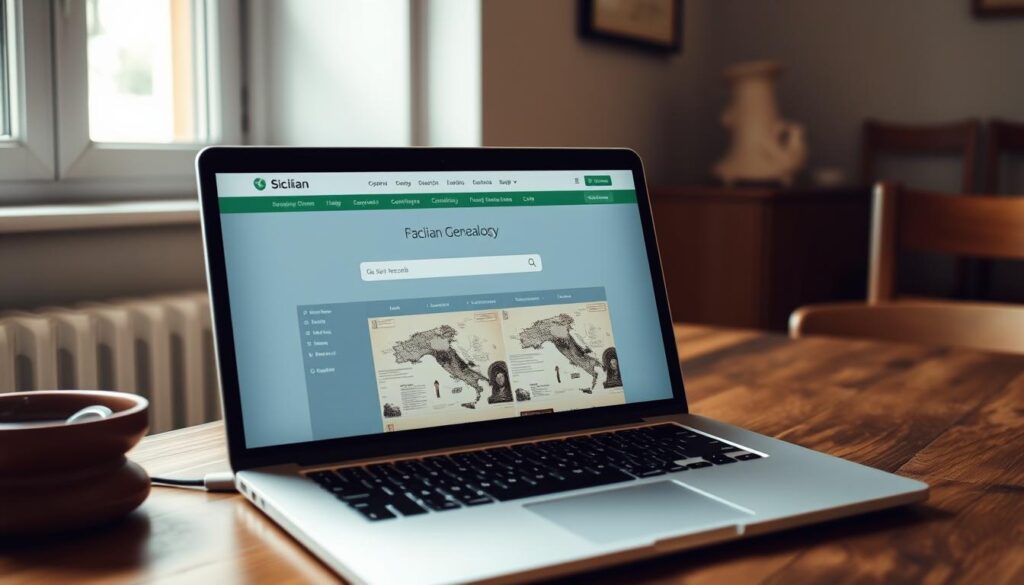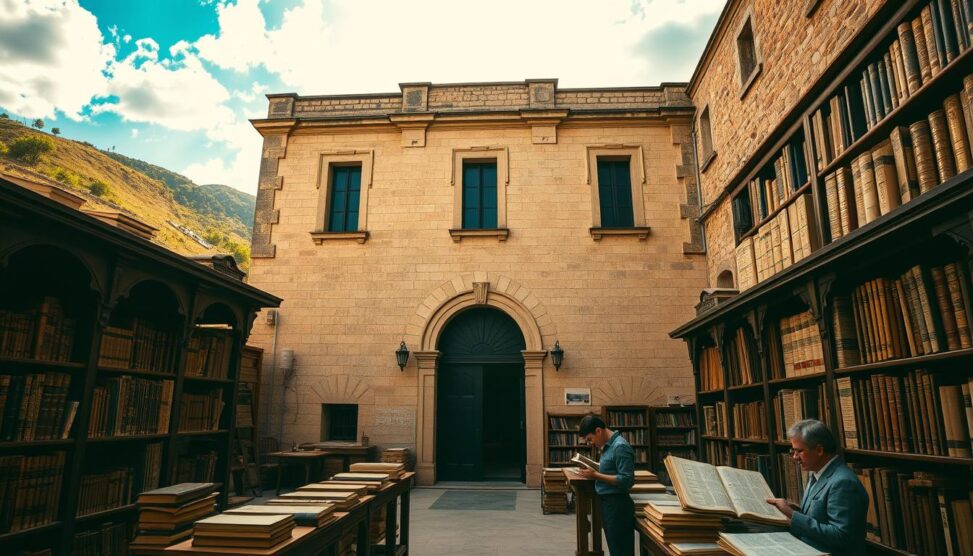Tracing Sicilian ancestry is an exciting journey into family history. It connects you with your heritage and ancestors’ stories. About 3.5 million Americans have Sicilian roots, making genealogical research popular.
Sicily’s archives are a goldmine for family history seekers. They hold records from the 16th century onwards. These include birth, marriage, and death certificates in about 1,500 local archives.
Sicilian genealogy tours offer a unique way to explore your roots. Expert guides lead you through family-connected locations and ancestral homes. You might even meet distant relatives. These tours cost between €1,500 and €5,000.
The journey of discovery is as rewarding as the destination. Genealogy research has grown by 25% worldwide in the last five years. It’s an ideal time to start your Sicilian ancestry adventure.
Prepare for an emotional journey through your family’s past. The Sicilian ancestry records hold secrets waiting to be uncovered. You’ll forge a deeper connection to your family history.
Introduction to Sicily Genealogy Archives
Exploring your Sicilian roots connects you to a rich cultural heritage. Sicily’s genealogical records are packed with valuable information. These documents allow you to trace your family history back several centuries.
Sicily’s oldest baptismal and marriage records date back to around 1500. Tax census records provide data every few decades from the same period. This level of detail is rare in Europe.
About half of Sicilians can trace their lineage to circa 1500. These well-preserved records make this possible. It’s an impressive feat in genealogical research.
Sicilian genealogy archives help you uncover your family’s fascinating history. You can reconnect with distant relatives and understand your ancestral roots. These archives contain historical records like birth, marriage, and death certificates.
“Until around 1880, approximately 70% of Italians (including Sicilians) were illiterate tenant farmers, farm workers, and day workers, while about 20% of the population were skilled craftsmen, scholars, jurists, and other professionals.”
Researching Sicilian genealogy comes with costs. Hiring a professional genealogist in Sicily typically starts at €500.00. Privacy laws often limit access to recent records.
You may need to offer at least €200 to pastors. This helps gain access to historical parish records. It’s considered support for their assistance.
Key Resources for Researching Sicilian Ancestors
Sicilian ancestral research relies on several crucial resources. Civil registries and vital records from 1820 to 1860 are essential. These documents are available at provincial state archives and municipal offices.
Church records are another vital resource, often dating back to the 16th century. Sicily’s oldest baptismal and marriage records are from around 1500. Many Sicilians can trace their lineages to the sixteenth century.
Rivelli documents at the Palermo state archive date back to circa 1500. They provide valuable insights into ancestors’ lives. Before 1880, most Italians were illiterate farmers or day workers.
“In a comparison, a proven, generation-by-generation pedigree to 1600 is exceptional in most of Europe.”
Privacy laws may restrict access to recent vital statistics records. Pre-1800 record scans might be hard to read. Professional genealogists in Sicily charge at least €500 for a project.
Parishes may require a minimum €200 donation for accessing their records. This fee helps maintain these valuable historical documents.
Major Genealogy Archives in Sicily
Sicily’s archives hold a wealth of genealogical records. The State Archives in Palermo house tax census records from the 16th century. These documents offer insights into ordinary Sicilians’ lives, with many families traceable to the 1500s.
Local municipal archives across Sicily contain vital statistics acts from 1820 onwards. Civil registration in Sicily began earlier than in England and Scotland. Sicilian marriage records often include more details, such as marriage contracts.
Church records are crucial for Sicilian ancestry research. The Diocese of Caltagirone’s records span from 1502 to 1942. The Archdiocese of Catania’s Catholic Church records are available from 1515 to 1941.
The Diocese of Acireale’s church records cover 1560 to 1950. Baptism records in Aci San Filippo date back to 1860. These religious documents often predate civil registration.
“Sicilian genealogical records offer an unparalleled opportunity to explore one’s ancestry, with a preservation rate and historical depth that sets them apart from other European regions.”
Accessing Sicily’s genealogy archives may require appointments and correspondence with local officials. Patience is key, as response times can vary. Using Italian in formal communications is recommended.
This approach can improve responsiveness from local authorities. It may also help facilitate the research process.
Online Platforms for Sicilian Genealogy
Researching Sicilian roots has become easier in the digital age. Online genealogy platforms offer many resources for discovering family history. These platforms help connect you with others exploring similar family lines.
FamilySearch provides free access to millions of digitized vital records. Their complete microfilm collection is now available online. Ancestry offers thousands of databases, including US Census and Immigration & Naturalization records.

MyHeritage is known for its extensive collection of user-submitted family trees. It fosters a collaborative environment for genealogical research. Find My Past features a robust Catholic Church Heritage Archive collection.
American Ancestors specializes in records from colonial times, particularly in the New England area. It’s a subscription-based service for those seeking specific historical information.
“Researching my Sicilian heritage was made easier with the help of online genealogy platforms. The wealth of information available at my fingertips was truly astonishing.” – Maria Rossi, genealogy enthusiast
Jewish Gen provides free resources for those researching Jewish ancestry. It includes a Family Finder and Holocaust Database. Find A Grave helps locate family members buried in the same cemetery.
Fold 3, part of the Ancestry family, specializes in military records. It offers free access through local Family History Centers. These platforms can help uncover your family’s story.
Explore the vast array of online resources available for Sicilian genealogy. From Sicily genealogy databases to Italian genealogy resources, you can connect with your roots.
Tips for Navigating Sicily Genealogy Archives
Exploring Sicilian roots through genealogy archives is thrilling yet challenging. Sicily ancestral research tools help you dive into your family’s past. The Sicilian genealogy database holds vital records and historical documents.
To use Sicily family history resources effectively, understand Italian record-keeping. Many records are in Italian or Latin. Brush up on language skills or use translation tools when needed.
“The key to success in Sicilian genealogy research is patience, persistence, and a willingness to learn.” – Angelo Coniglio, Genealogist and Author
Learn traditional naming conventions and social practices of the time. Children were often named after grandparents or saints. Women usually took their husband’s surname upon marriage.
Each discovery brings you closer to understanding your Sicilian heritage. The journey itself is as rewarding as the destination. Enjoy uncovering the lives of your ancestors.
Utilizing Social Media for Research Support
Social media platforms are powerful tools for exploring Sicilian ancestry records. Facebook hosts vibrant communities of Sicily genealogy enthusiasts. Here, researchers can share knowledge, seek guidance, and collaborate on their family history projects.

Joining specialized Facebook groups can provide valuable support and insights. One researcher found a fourth cousin through Facebook after a year of monitoring. Social media connects people with shared interests in Sicilian genealogy across great distances.
“A significant family discovery was made via Facebook, resulting in a reunion that connected family members across three generations.”
Engaging with local historians and genealogists in Sicily offers unique perspectives. These experts know regional archives well. They can guide researchers through the complexities of Sicilian ancestry records.
Social media also preserves and shares family histories. A 1944 wedding photo with a handwritten message was shared online. This highlights the importance of preserving family documents over time.
Digitizing and sharing these precious artifacts ensures a family’s legacy endures. Future generations can connect with their past through these shared memories.
Overcoming Challenges in Genealogical Research
Tracing Sicilian roots can be exciting yet challenging. Incomplete records, name changes, and date mix-ups often trip up family historians. But with the right tools and methods, you can conquer these hurdles.
Cross-referencing multiple sources is a smart move. Compare church registers, civil records, and census data. This helps fill gaps and verify your findings. Sicilian records, though sometimes scattered, offer valuable clues.
“Persistence and creativity are key to finding missing records and piecing together family histories.” – Genealogy expert
Search for different spellings of surnames. Sicilian names changed due to dialects, pronunciation, or clerical errors. Check regional name dictionaries and try variant spellings. This can help you find ancestors in Sicily’s genealogy archives.
Team up with experienced researchers and genealogy groups. Join online forums and attend workshops. Connect with local historical societies. These can provide guidance on Sicilian family research.
Use these strategies and Sicily ancestral research tools to uncover your heritage. With dedication, you can turn challenges into exciting discoveries. Connect generations and preserve your family’s story.
Case Studies: Success Stories in Sicily Genealogy
Sicily genealogy archives have helped many uncover their Sicilian ancestry records. Through careful research, people have made amazing discoveries about their family history.
A woman found her great-grandfather’s birth certificate in a small Sicilian town. This document revealed new details about his parents and siblings. She traced her family line back several generations.
A man was stuck in his research, unable to find records beyond his grandparents. He used online platforms and connected with distant relatives. This led him to a treasure trove of family documents.
He discovered marriage certificates and death records. These findings helped him break through his research roadblock. He also found long-lost cousins who shared his passion for genealogy.
“Finding my Sicilian ancestors’ records was like unlocking a door to the past. It brought tears to my eyes to finally see their names and know their stories.” – Maria, successful genealogy researcher
These stories show the power of persistence in genealogy research. Sicily’s archives are valuable resources for uncovering family history. Many have connected with their Sicilian heritage using these tools.
Preserving Your Family History Documentation
Protecting Sicilian heritage documents is vital for future generations to explore their roots. Proper archiving techniques are crucial for preserving Sicily genealogical records. Store valuable Italian genealogy resources in acid-free containers to prevent deterioration.
Maintain the right temperature and humidity levels in your storage area. This helps protect your family history documentation from damage. Digitizing old Sicilian records, like photographs and letters, is another effective preservation method.
Digital copies safeguard precious documents against physical damage. They also make them more accessible to family members interested in exploring their Sicilian ancestry.
FamilySearch.org and the Italian government have digitized millions of Italian records. These include birth, marriage, and death records dating back to 1806. Significant enforcement began during the Napoleonic period until 1815.
The Stato Civile della Restaurazione (SCR) records were established from 1815 to 1865. They were influenced by Bourbon king Ferdinando IV. Some records followed Napoleonic styles beginning in 1816.
“The civil registration process has gone through various significant changes in record-keeping practices throughout distinct historical periods in Italy.”
Sicily began adopting Napoleonic style civil record keeping in 1820. This followed its introduction in other regions. Understanding historical context helps navigate available resources more effectively.
Different periods of record-keeping in Italy can reveal valuable information about your ancestors. This knowledge aids in uncovering your Sicilian roots more efficiently.
Conclusion: Your Journey into Sicilian Heritage
Exploring Sicilian roots through genealogy archives is a rewarding experience. You’ll gain insight into your family’s history and the factors that shaped their lives. Research may take longer, but the wealth of information makes it worthwhile.
Vital records from Italian towns typically span from 1820 to 1910. Some records date back to the 1500s. FamilySearch provides online access to these records, making it easier to trace your lineage.
You may face challenges like language barriers and common surnames in small communities. With persistence and expert help, you can overcome these obstacles.
Uncovering ancestral stories may inspire you to visit hometowns or connect with distant relatives. Creating a family history book preserves your findings for future generations.
Incorporating Sicilian customs, recipes, and language into your life celebrates your heritage. It ensures your ancestors’ legacy lives on. Take pride in your rich Sicilian ancestry and its impact on your identity.





Leave a Reply